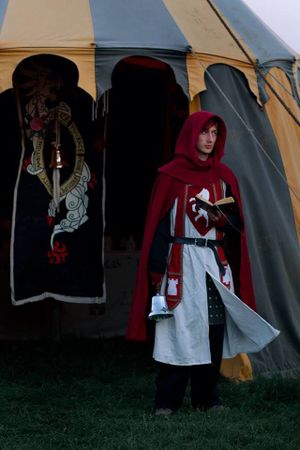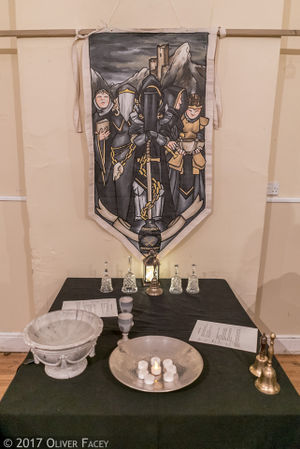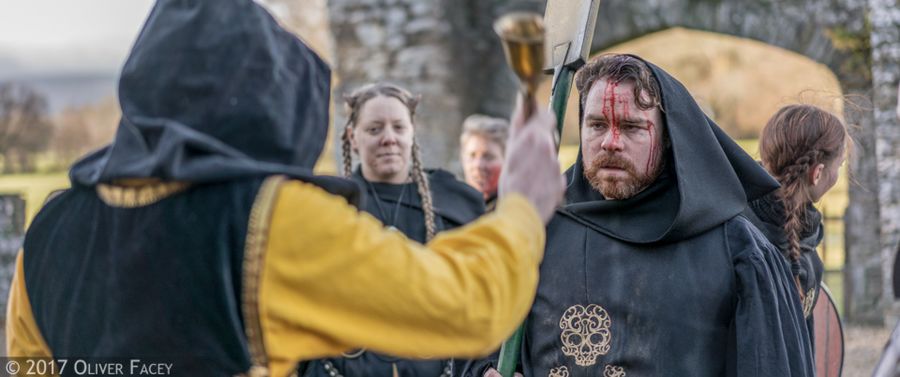Highguard hearth magic
Overview
In the world of Empire, formal magic is the application of learning and willpower to create supernatural effects. There is another form of magic, however which does not require the user to be a magician. Hearth magic employs the innate natural magic of the world to produce subtle but significant effects in much the same way that a compass needle always points true north. The magic is not based on the abilities of a magician, but relies on the innate mystical properties of the world. Hearth magic is usually subtle rather than potent, and where formal magic is predictable and reliable, hearth magic is none of these things.
While the principles that underlie hearth magic are common throughout the world, in Highguard, there are certain specific practices, customs, or traditions that draw on the power of the world's innate magic. Often these proud customs are nothing more than traditions - but sometimes their practice taps into some facet of the world resulting in a truly magical effect.
You can learn more about hearth magic, what it is and how it works, here.
Bells and Chimes
Bells are associated both with the dead, and with the Labyrinth itself. The Highborn hang wind-chimes in their homes and to bring back memories of those they have lost. Meditating to the sound of chimes or bells is said to allow the dead to “speak” to the living through their memories. There are even rare accounts of Highborn pilgrims who claim to have heard a recently departed close friend or family member speaking to them over the sound of pealing bells. It is commonly held that bells can speak for those who have died, and have no voice of their own; that the memories that the sounds stir are chosen not by the listener but by the departed.
Those who have had near-death experiences often speak of hearing the sounds of bells tolling. When the ritual Whispers through the Black Gate is performed and the conjured spirit is present, the sound of bells can be intermittently heard. As the ritual magic ends, the bells peal out to call the ghost back through the "Black Gate". Regardless of what is actually occurring with this potent Winter ritual, there is a clear connection between bells and the dead, especially ghosts.
While the sound of bells reminds the living of the dead, it also exerts an uncanny influence over the unquiet dead, especially ghosts and revenants. Restless spirits will not approach the sound of chimes - meaning many Highborn make a point of hanging them in the doors and windows of their homes - and the ringing of bells can actually cause such creatures to recoil or in rare cases even flee. Stewards of the dead theorise that these sounds not only remind the living of the dead, but remind the dead of the time when they were alive. Most people who spend any time around the dead - especially the stewards of the dead and magisters - will keep a bell on their person at all times.
Bells and Chimes in Play
Hanging wind chimes and carrying bells are simple ways to invoke this hearth magic. During a conversation, it's easy to make a point of listening to a bell ringing, or the sound of wind chimes, and using it as a prompt to talk about memories of a dead friend or family member. You can treat this as if you've been prompted to remember something they said to you, or you could even roleplay hearing their voice, depending on the drama of the situation. This is meant to be something rare, but used judiciously, at the right time it can create a powerful roleplaying moment.
When dealing with the unquiet dead, you can use chimes to try and ward and area or keep a ghost at bay. If you have a bell, you can toll it to try and overwhelm the spirit with feelings of loss, making it easier to deal with. Our NPC ghosts and unquiet dead are briefed on how to respond to chimes and bells, but it might not always be the way you expect. After all, hearth magic is rarely predictable. Experience has shown that some spirits will respond just as strongly, or in different ways, to other sounds that had special meaning to them in life. For example, a Kallavesi revenant (a dead body possessed by a ghost) might be overwhelmed by the sound of a Wintermark battle horn whereas a ringing bell might fill them with rage.
A word of warning however, not all dead things are affected by such sounds. Creatures such as the husks created by Quickening Cold Meat, or the vallorn are dead bodies animated by an unnatural force rather than by the spirit of someone who has died. They have no mortal memories to invoke so they are not affected by this hearth magic.
Cowls and Veils
Wearing a cowl or veil allows someone to speak from the soul. By setting aside their external appearance it reveals the wearers essential nature in its place. It allows a person to put aside distractions and to speak and act with confidence and certainty. This magic can manifest in different ways for different people - one Highborn may become calm and collected, another might speak with passion, while a third may become cruel and bitter. Paradoxically, the cowl hides the face but reveals something profound about the person wearing it.
In Highguard, donning a veil is seen as a way of preparing yourself to put aside worldly or mundane considerations to allow yourself to focus on Virtue, so veils are used when matters of great import must be discussed. When the Highborn don veils or draw up their cowls as a group, it means they are about serious business. They step away from the world for a short time and become apart from it - a tradition that leads to many Highborn circles ceremonially donning cowls or veils when they must talk of matters of justice, or frankly discuss sensitive matters.
A cowl or veil may also conceal the identity of the wearer in a more literal sense. Veiling can be particularly effective when dealing with eternals. Although mortals are rarely fooled, creatures of the realms often find it hard to identify whom they are speaking to when dealing with someone wearing a cowl or veil. Crucially beings such as the Whisper Gallery and Kimus are commonly baffled by veils when scrying; they know what has occurred but have no idea who was involved. Other magical beings such as tulpas or ghosts may be similarly affected - the Cowl of Ashes for example draws on this hearth magic to render the wearer completely invisible to a spirit summoned by Whispers Through the Black Gate.
Veils and Cowls in Play
A cowl or veil is license to change how you portray your character, and a rare opportunity to reveal your "essential nature". A veil does not completely change your character; rather it provides license to add nuance and bring out your inner personality. A relaxed and fun-loving Highborn who becomes cooler and more calculating when they wear their cowl reveals something very different than if you roleplay a greater concern for other people while veiled. As much as possible, it is good to keep the change consistent - the hearth magic of cowls and veils is meant to bring out a deeper facet of your character's personality rather than change it completely.
At the very least, donning a cowl or veil helps you put aside distractions and worldly matters and become more focused on the matter at hand. It's also a wise thing to do if you are dealing with a ghost or an eternal and don't trust them or want to take precautions against any bad intention they may have.
Roleplaying that you do not recognise someone who is suitably veiled, even though you actually know them well, can add a dramatic mystical element to any encounter on the field. Likewise, if you are involved in a secretive discussion it is entirely appropriate to veil or cowl yourself - and encourage everyone else who is present to do the same - with the understanding that this will make it harder for anyone to eavesdrop on your conversations with magic.
You don't have to cover your face entirely to evoke the hearth magic of cowls and veils. A diaphanous veil that you can easily see through is just as much a barrier between you and the world as the heaviest hood. Likewise pulling your hood up so it throws your face into shadow is fine, you don't need to literally cover your face.
Journals and Histories
Writing something down captures part of the essence of the thing. In Highguard, this hearth magic is most commonly invoked through the creation of journals. Many Highborn keep journals - diaries or collections of letters which describe important events. Creating a history of something ensures that the moment remains significant and enduring by preserving the Virtue of the moment in writing. The goal with such accounts is not to diarise every moment from a person's daily routine, but rather to focus on the most personal and most important occurrences - and to try to record them in ways that capture what was truly significant about them.
Provided the words are suitably uplifting and moving, writing can cause Virtue to bloom in even the blackest heart. In some cases, reading a particularly inspiration journal may result in someone gaining a unique spiritual aura. It's not common, but there are journals, diaries, scrolls, and collections of letters in several chapters across Highguard whose pages contain a powerful, durable aura that touches everyone who reads them. Indeed these books have a marked tendency to imbue their readers with spiritual auras in their turn. The power resides in the physical texts not just the words themselves - copies of such writing might still be inspirational but they are not intrinsically magical.
Journals and histories in Play
Creating an in-character journal can be a daunting exercise, but the idea that you only write down the most significant events in your life is the perfect justification for why your journal can be concise and be focused on events at Anvil. If you enjoy writing, there's nothing to stop your filling your journal with stories between events - it can be an interesting way to add depth to your character. But the easiest way to keep the contents relevant to play is to create short, vivid accounts of the most important moments that your character was directly involved with. Rather than a journal, a less time-intensive way to represent this hearth magic might be in writing a letter either to another player or to a fictional character. A letter requires significantly less effort than a journal but can serve all the same purposes - allowing you to review events and creating an out-of-character prop that can be shared with other players.
You can write letters or add an entry to a journal between events - but it can also be fun to do this while in-character. Spending half an hour in the evening recording the major events of the day can evoke the Highborn hearth magic, but it can also help to go over those events and consider what they mean for your character. It can even be a communal activity - chatting with your character's friends while writing can create a comfortable, mundane scene that is immersive and fun to roleplay. Over time such writing becomes a valuable in-character artefact, and when your character is done can remain in play as the foundation for other players' roleplaying - especially if the journal contains secrets or information that might not have come out in play. For the same reason, you may want to try and keep your journal in an in-character location simply to create drama if someone else reads or steals it.
When writing you may want to think about how "future generations" might be inspired by the events you describe and frame them accordingly. The Highborn place much more emphasis on a story that exemplifies virtue than they do on recording "facts". It is more important that it be engaging and compelling than it be technically accurate.
Corruption and Purification
There is a pernicious hearth magic that impairs things that are corrupt or impure and makes them liable to fail. A sword caked with mud and grime is more prone to shatter or bend while food quickly spoils if it is not kept clean and dry. Rust and rot are infections that will quickly spread if left unchecked. The mortal body is no different, any impurity can quickly lead to disease or weakness unless it is removed. Worse, corruption (like virtue) can be contagious. Soiled hands soil whatever they touch.
Purification removes this taint, cleansing and restoring something. Both water and fire are known to be effective means of purification. While fire will destroy things if left unchecked, metal objects can be purified with an open flame, and many surgeons will purify their tools with ceremonial fire at the start of the day. Water is especially important to the Highborn, who make extensive use of washing to keep impurities from the body. The Highborn traditions around washing and cleanliness draw on this hearth magic - even when only employing a few drops of water. Performed correctly they provide a degree of protection against baleful magics that bring poison or disease. This can be crucial when fighting enemies such as the Druj or the vallorn.
Highborn who feel they have acted unvirtuously may symbolically wash themselves before beginning to make amends for their behaviour. It is a common metaphor to talk of washing to purify the soul, but you cannot wash away unvirtuous deeds with water or fire. Purification cannot exculpate vice from the soul - only virtuous deeds can remove such a stain. Most Highborn priests encourage washing to prevent disease or sickness as an act of Vigilance, and many encourage their congregation to use their time washing to consider how they can overcome their failings and be more virtuous in the future.
Corruption and purification in Play
You might keep a bowl of water or a jug in your tent, so people coming in can wash their hands. Likewise, when you visit people in other nations, asking for a little water to wash your hands can remind them that you are Highborn. You can also carry a water skin or similar when you are away from home to make use of it to wash your hands at dramatically appropriate times. If the first thing you offer a stranger is a little water to wash their hands, it highlights the emphasis the Highborn place on cleanliness. If people choose not to avail themselves of this opportunity to wash, you can react accordingly to their decision not to cleanse themselves.
Fire can be more challenging to use - but you might still draw on this hearth magic by meditating with a candle, for example, or by ensuring that a document containing wicked slanders or heretical thoughts is burned to ash before it can infect anyone else. Likewise, you might call for the dead bodies of those who succumbed to pestilence or curses to be burned to ensure that they do not contaminate the living.
This can be a particularly important hearth magic if you are tending the sick or wounded. If you are a chirurgeon you might wash your hands, or those of your patient, before you examine them. If you use metal chirurgeon's tools you might make a show of passing them through an open flame for a moment as you are preparing to go to work on a patient - although obviously be aware of the safety of yourself and your fellow players! This hearth magic is primarily about cleansing and purifying things to prevent the spread of sickness or physical corruption. The germ theory of disease does not apply in Empire - the source of such ailments is the pernicious hearth magic of corruption.
It is also important to stress that the spiritual dimension of this hearth magic is purely symbolic, nobody believes that sickness results from a lack of virtue. Washing someone removes corruption from the body, it does not remove vice from the soul, so there is no tradition in Empire of burning people to purify their souls. This caveat aside, spending a moment to ceremonially wash the hands or face before embarking on some important activity, or engaging in a liao ceremony, can not only brings out Highborn tradition but also allow you a few moments to collect your thoughts and prepare for the roleplaying to come.
Further Reading
Core Brief
Additional Information


